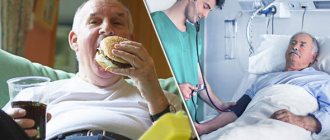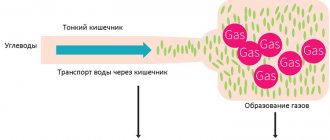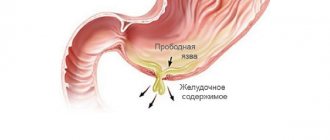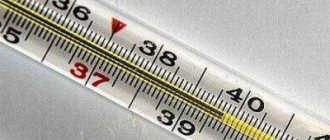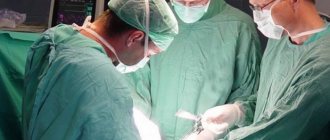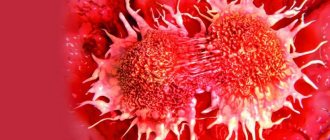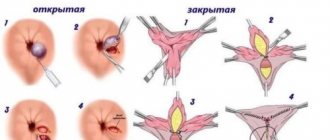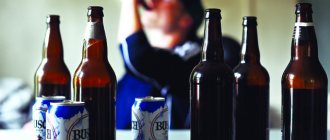Home Survival problems
Author: Alexey Shevchenko July 14, 2020 23:35 Category: Survival problems
Greetings, dear readers of Alexey Shevchenko’s blog “Healthy Lifestyle”. Today I want to continue the conversation about the features of diet for cancer and devote an article to the topic of nutrition for colorectal cancer.
- 1 Colon cancer and diet have a direct connection
- 2 Diet features
- 3 Precautions
- 4 Features of the postoperative diet
- 5 Sample menu for convalescents
General information about cancer
Hundreds of thousands of cancer cells are formed in the human body every day. However, the immune system quickly destroys them, sending special “defender” cells to the tumor site. This process is called apoptosis or planned cell death. However, when the activity of these cells decreases, the immune system is not always able to recognize malignant antigens. As a result of this, some of the mutated cells remain alive and begin to multiply uncontrollably. After two or three divisions, hereditary defective characteristics are fixed in them. After the fourth cycle of reproduction, atypical cells transform into malignant neoplasms (oncogenesis).
Factors that provoke a decrease in natural antitumor protection:
- chemical carcinogens (tobacco combustion products, food saturated with preservatives, industrial waste, synthetic pharmaceuticals);
- biological carcinogens (Epstein-Barr virus, adenoviruses, papillomaviruses, herpesviruses).
- physical carcinogens (radioactive, electromagnetic, ultraviolet, x-ray radiation);
- endogenous carcinogens (toxins and wastes formed as a result of metabolic dysfunctions);
- genetic predisposition (chromosomal defects).
Remember, the main task of nutrition in cancer is not so much to slow down tumor growth as to protect the body from carcinogenic intoxication.
Nutrition for cancer
Considering that the immune system plays a key role in the fight against tumor processes, to improve the condition of a cancer patient, it is extremely important to increase the activity of the anticarcinogenic system.
Other goals pursued by diet therapy for cancer:
- improvement of liver detoxification function;
- acceleration of healthy tissue regeneration;
- normalization of metabolism (including the synthesis of enzymes, hormones, protective antibodies);
- saturating the body with energy and plastic resources;
- acceleration of the removal of toxins and waste;
- maintaining homeostasis (coordinated physiological processes).
Foods with anti-cancer properties:
- Algae (spirulina, chlorella, wakame, kombu, dulse). Contains powerful inhibitors of cancer cell growth - fucoxanthin, fucoidan, phycocyanin.
- Leafy greens (alfalfa, onions, garlic, spinach, celery, parsley, lettuce, cumin, parsnips, carrots, wheat germ, mustard). The pigment composition of green plants is represented by chlorophyll, which is a natural source of organic iron. This substance prevents damage to the genetic material of the cell, neutralizes the effect of food carcinogens, stimulates the production of enzymes and protective antibodies, improves the rheological parameters of the blood, accelerates phagocytosis (the process of absorption of foreign agents), and has an anti-inflammatory effect on the digestive tract. In addition, leafy greens contain large amounts of essential nutrients (vitamins, minerals and amino acids).
- Fruits and vegetables of orange, red and yellow colors (lemons, tomatoes, pumpkin, carrots, grapefruits, apricots, peaches, plums, apples, tangerines, beets). The products contain strong antioxidants (lycopene, beta-carotene, ellagic acid, lutein, quercetin), which increase the body's natural antitumor defense, neutralize oxidative stress, and protect body cells from ultraviolet radiation.
- Cruciferous vegetables (white sprouts, cauliflower and Brussels sprouts, broccoli, radishes, kohlrabi, turnips). They contain powerful antitumor elements (indole, glucosinolate), which reduce the rate of germination of new blood vessels in “cancerous” lesions, initiate the self-destruction of malignant cells, and increase the detoxification function of the liver.
- Bee products (honey, propolis, beebread, pollen, royal jelly). This food has antitumor, antioxidant, immunomodulatory, anti-inflammatory, antitoxic, analgesic and regenerating effects on the body.
- Wild berries (cherries, cranberries, blackberries, blueberries, raspberries, wild strawberries, mulberries, strawberries, currants, cherries). The peels of medicinal products contain many antioxidants and angiogenic inhibitor substances that prevent the development of metastases, absorb free radicals, reduce inflammatory processes in tissues, and neutralize the effects of exogenous toxins. In addition, wild berries are rich in ellagic acid, which counteracts the binding of carcinogenic toxins to cell DNA, stimulates the encapsulation of tumor tissue, and initiates apoptosis (death) of malignant tumors.
- Green beans (lentils, peas, soybeans, chickpeas, asparagus). They contain a large number of protease inhibitors (trypsin and chymotrypsin), which slow down the division of atypical cells (due to the production of highly active anti-cancer enzymes) and accelerate the elimination of toxic substances (after the use of cytostatic agents and radiation therapy). In addition, beans supply the body with high-quality protein - a “building material” for muscle tissue.
- Fruit seeds and nuts (walnuts, flax, almonds, sesame, sunflower, pumpkin). These products contain lignans, which have an estrogen-like effect on the body (regulate the production of sex hormones). With a lack of these substances, the susceptibility of cells to genetic mutations increases, and dangerous enzymes that activate tumorigenesis in the mammary gland accumulate. Along with this, nuts and seeds contain a large amount of protein structures, vitamins, minerals and fatty acids.
- Japanese and Chinese mushrooms (cordyceps, shiitake, maitake, reishi, which contain the polysaccharide beta-glucan). They have powerful immunostimulating and antitumor effects on an exhausted body. At the same time, mushrooms “freeze” foci of malignant tumors, slow down the spread of metastases, and neutralize tumor decay products.
- Green tea. Includes healing catechin (epigallocatechin gallate), which suppresses angiogenesis in the foci of the tumor process and inhibits the development of metastases.
In addition, to suppress the malignant process, it is advisable to include aromatic herbs (turmeric, rosemary, mint, cumin, basil, thyme, marjoram, cloves, anise, cinnamon) in the daily menu.
Carcinogenic products prohibited for cancer:
- rich broths from meat, poultry or fish;
- margarine;
- white sugar;
- whole milk;
- canned food, pickles, marinades:
- offal, semi-finished products, sausages;
- smoked, pickled, spicy, fatty dishes;
- baked goods, confectionery;
- sweet carbonated drinks;
- frozen food;
- packaged juices;
- processed cheese;
- store-bought mayonnaise;
- heated fats;
- potatoes (after December);
- premium flour;
- vinegar;
- baker's yeast;
- soda;
- packaged alcohol.
Live food
To normalize the condition of the intestines, not only exclude foods that provoke the continuation of the disease, but also add healthy dishes to the menu. For bowel cancer, a diet is developed indicating what foods to eat to improve digestion.
In cancer, the immune system plays an important role. 80% of the cells involved in maintaining high immunity are located in the intestines. Also important is normal microflora, which actively cleanses the body of pathogens. To maintain it, the diet must contain fermented milk products with live bifidum bacteria (bio-yogurts), and plant fiber containing coarse dietary fiber.
- removes carcinogens and toxins;
- stimulates the growth of normal microflora;
- enhances peristalsis, which prevents the absorption of toxic substances and bile acids into the blood;
- increases the volume of feces due to the absorption of liquid, softens them, promoting better cleansing.
Every day you need to include in your diet foods that contain it in large quantities: fruits (dried fruits) and vegetables, cereals (wheat, oats, barley, rye).
| Type of dish | Authorized product |
| Greens and vegetables | Potato |
| Bell pepper | |
| Broccoli | |
| Cucumber | |
| Pumpkin | |
| Carrot | |
| Jerusalem artichoke | |
| Dill | |
| Buryak | |
| Meat | Veal |
| Chicken | |
| Beef | |
| Turkey | |
| Rabbit | |
| Seafood and fish | Red and white fish |
| Caviar | |
| By-products | Beef liver |
| Chicken liver | |
| Porridge | Buckwheat |
| Oatmeal | |
| Jachka | |
| Wheat | |
| Semolina | |
| Brown rice | |
| Fermented milk products | Cottage cheese |
| Sour cream | |
| Low fat milk | |
| Cheese | |
| Bread | Rye |
| Wholegrain | |
| With bran | |
| Oils | Creamy |
| Vegetable | |
| Fruits | Avocado |
| Strawberry | |
| Grapefruit | |
| Kiwi | |
| Orange | |
| Currant | |
| Apple | |
| Watermelon |
We invite you to familiarize yourself with the use and analogues of the antimycotic drug Triderm After identifying a malignant tumor, it is necessary to quench your thirst with still water or green tea.
For oncology drinks, preference is given to still water, green tea and diluted fresh juices. It is not recommended to drink freshly squeezed juices on an empty stomach. The most useful are orange, carrot, pumpkin, tomato, apple and tangerine juices. Before drinking mineral waters, an additional consultation with an oncologist is recommended.
Basic rules of nutrition for cancer
When drawing up an “anti-cancer” nutritional plan, it is important to take into account the location of the tumor process, the stage of its development, the nature of the course, the patient’s condition, the list of concomitant diseases, and the nuances of the prescribed therapy. For example, after operations on the gastrointestinal tract, especially when part of the intestine and/or stomach is removed, the absorption of nutrients from food deteriorates, which is why food should be easily digestible and highly nutritious.
With liver cancer, in 80% of cases, swelling of the parenchyma occurs, “pressing” on the adjacent areas of the stomach and making it difficult for food to move into the intestines. In this case, diet therapy should be aimed at improving the secretory function of the gastrointestinal tract (reducing flatulence, feeling of heaviness, pain) and enhancing the detoxification functions of the affected organ. However, before drawing up an “anti-cancer” menu (for all types of pathology), it is important to calculate the number of kilocalories consumed by the patient. As a rule, the energy value of their diet does not exceed 600–800 kilocalories (due to loss of appetite and rapid satiety). Due to the low calorie content of the food menu, in 90% of cases, normal metabolism is disrupted, and a person rapidly loses weight.
To maintain a stable weight, it is important for the patient to consume at least 30 kilocalories per kilogram of body weight. If you need to gain weight, the energy value of the diet is increased to 40 kilocalories. In addition, when selecting food products, the optimal ratio of food components is taken into account: carbohydrates - 55%, fats - 30%, proteins - 15%.
General nutritional requirements:
- Chew food thoroughly. This will help improve the absorption of nutrients in the digestive tract.
- Eat small meals. The optimal frequency of meals is 6 – 7 times a day.
- Consume food in small portions. To avoid bloating and defecation disorders, eat no more than 200 grams of food at one time.
- Eat only freshly prepared food. The maximum shelf life of food in the refrigerator is 12 hours.
- During resection of the digestive tract, consume food only in softly ground form.
- Maintain drinking regime. To speed up the elimination of toxic substances, you should drink at least 2 liters of still water per day (for kidney cancer, the daily volume of liquid is agreed upon with the oncologist). In case of vomiting or diarrhea, the daily portion of water is increased to 3 liters.
- Use gentle methods of heat treatment of food (boiling, baking, steaming). This will help “unload” the liver, since frying releases a huge amount of carcinogens.
- Eliminate too hot and cold foods from your diet.
Remember, after surgery on the stomach or intestines, fruits are consumed only in the form of compote and jelly, and vegetables in the form of puree.
Features of the postoperative diet
After the operation, the patient has to go through a difficult ordeal - he needs to learn how to use and care for the colostomy. There are no natural urges, and everything has to be done by the hour, so strict adherence to the doctor-recommended diet and regimen is absolutely necessary.
The first day after surgery, a person cannot eat or drink. Then, in the first few days, a special liquid diet is prescribed that does not irritate the intestines. Such food cannot provide the amount of vitamins and other substances necessary for life, so they are administered with the help of drugs.
Meals are served to the patient strictly according to schedule.
Useful tips
- For nausea (especially in the morning, without getting out of bed), eat several slices of toast, bread or biscuits.
- To eliminate irritating odors (food, household, cosmetic), ventilate the room more often.
- To increase the body's antioxidant protection, add garlic, onions and fresh herbs to food (to improve appetite).
- When the mucous lining of the digestive tract is inflamed, it is important to avoid overly sweet, bitter and sour foods. To reduce the irritating effect on the digestive tract, fruit, vegetable and berry juices are diluted half with clean water, or jelly is prepared. Along with this, limit the intake of foods that cause increased secretion of gastric secretions.
- If there is difficulty swallowing or chewing, preference is given to soft foods: soups, boiled porridges, grated vegetables, chopped fruits and berries. If necessary, use baby food.
- In case of diarrhea, limit the intake of fresh fruits, vegetables, and salads, which cause a laxative effect. At the same time, strengthening products are introduced into the daily menu: unsweetened crackers, bread, potatoes, cottage cheese, flaxseed, rice. To reduce bloating, use decoctions of dill, fennel, and chamomile.
- To stimulate the evacuation function of the intestines, the patient’s diet is enriched with fiber (fruits, vegetables, herbs, berries, cereals, seeds, nuts). Along with this, to eliminate constipation, drink 700 - 900 milliliters of pure filtered water before breakfast (within 1.5 hours).
- If salivation is impaired (as a result of radiation therapy), preference is given to pureed and liquid foods (herbal and fermented milk drinks, soft chopped vegetables, slimy porridges). In addition, chewing gum, sour fruits or candies are used to enhance the secretion of the salivary glands.
Prohibited Products
After removal of a malignant tumor, a patient with intestinal cancer continues to receive therapy - radiation, medication, chemotherapy. The diet during this period is especially strict; the well-being and recovery of the body greatly depends on its adherence.
A cancer patient will have to avoid the following foods for the entire treatment period:
- fat meat;
- fresh milk;
- fatty concentrated (strong) meat broth;
- baked goods made from wholemeal flour or whole grain products;
- vegetables that irritate the mucous membranes - radishes, garlic, onions, celery, spicy herbs - sorrel, cilantro;
- beans, peas, chickpeas, lentils - any legumes;
- hot seasonings and sauces - mustard, pepper, horseradish, ketchup;
- carbonated drinks, beer;
- fats, margarine, butter;
- whole milk;
- smoked products;
- canned fish and meat;
- mushrooms in any form, fresh or sauerkraut;
- synthetic food additives;
- peanut;
- instant coffee.
Only in the later stages of the postoperative period is it allowed to supplement the menu with whole grain cereals, lean boiled meat, vegetables and fruits. Many doctors believe that white sea fish is preferable to meat. Animal fat must be replaced with vegetable oil. Gradually, ground food is replaced with well-cooked food (slimy porridges, soups). But when adding new foods to your diet, you need to monitor the body’s reaction. If constipation or diarrhea does not appear, it means that motility and intestinal condition are improving and coping with the load.
FAQ
Do sweets speed up the growth of cancer?
Currently, there are many “anti-cancer” diets that exclude sucrose from the daily menu (based on the hypothesis that the tumor “feeds” on sweets). It is true that abnormal cells consume glucose during the process of dividing. However, this process is also typical for other structures of the body (brain, liver). If you completely abstain from sweet foods, cancer cells will still “satisfy” their energy hunger (due to the consumption of carbohydrates found in the muscles).
To date, there is no scientific evidence that people with a sweet tooth accelerate the growth and development of the tumor process.
Can you drink wine if you have cancer?
Yes. Periodic consumption of small portions of wine will not affect the growth and location of the tumor. The exception is the day of the chemotherapy session and the next day, since the organs affected by the toxic procedure have not yet recovered. Additional stress on the liver is also not recommended.
Does calcium food help cope with bone metastases?
No. Metastatic tumors of bone tissue arise as a result of the development of a malignant process in the primary organ (mainly the prostate or mammary gland). Therefore, diet therapy for cancer should be, first of all, aimed at removing the malignant focus and reducing carcinogenic intoxication of the body. In addition, at advanced stages of the pathology, total vascular calcification may be present (a strong increase in the concentration of a macroelement in the blood). In such cases, taking the nutrient is contraindicated.
Is it possible to consume milk and cream if you have cancer?
No, because regular consumption of whole milk products increases the risk of cancer by 30% (due to increased levels of insulin-like growth factor). This is evidenced by the results of two studies conducted by a group of scientists from Harvard University and the medical company Kaiser Permanente.
Does beet juice really help with cancer? How to drink it correctly?
Red beet juice inhibits tumor growth, reduces pain, normalizes hemoglobin and ESR, and increases the oxidation of cancer cells (5-10 times). The healing drink is effective for oncology of any type (especially for cancer of the bladder, stomach, rectum, lungs).
Basic rules for taking the “drug”:
- After preparation, the freshly squeezed juice is placed in the refrigerator for 2 hours (to volatilize harmful substances).
- “Juice therapy” begins with small portions (5 milliliters after each meal), gradually increasing the dose to the daily volume (500 – 600 milliliters). If you drink the daily portion in 1-2 doses, nausea, hiccups, pulse irregularities, surges in blood pressure, and pain in the epigastric region occur.
- Beetroot juice is taken 100 milliliters 5 times a day 30 minutes before meals.
- Before consumption, the juice is slightly heated (to a temperature of 36 degrees).
The duration of beet therapy is 1 year.
What to pay special attention to
After surgery, a person is left with a permanent or temporary colostomy.
There are problems with controlling the emptying process - the main inconvenience with an artificial anus. To partially solve the problem, you can use the correct daily diet. Among the berries and fruits, kiwi, watermelon, raspberries, bananas, and black currants are allowed. With the most strict diet, patients with rectal cancer immediately after surgery should fast for 1-2 days, only after that they are allowed to “feed” mucous pureed soups and porridges cooked in water.
The lack of vitamins and minerals in such a menu is compensated through the use of medications.
Nutritionists advise using gray bread, to which whole grains are added. In addition to compotes, green tea, jelly, rosehip decoction, the use of medicinal aromatic herbs is allowed: fireweed, chamomile, mint. You need to drink approximately 1.2-1.5 liters per day, including first courses.
The diet in the case of rectal cancer allows for the exclusion of factors that provoke irritation of the intestinal mucous membranes, as well as any pathological processes.
Nutrition for pancreatic cancer
For pancreatic cancer, the daily menu should consist of boiled, baked and steamed foods. To reduce the load on the organ, food (porridge, vegetables and seafood) is ground through a sieve before consumption. If, as a result of treatment, the pancreas affected by the tumor was removed, then insulin therapy is mandatory. An individual menu, in this case, is compiled together with an endocrinologist, taking into account the consumed bread units. Below is a menu for pancreatic oncology at the stage of preoperative chemotherapy or in cases where surgery is not possible.
Sample diet for a week
Monday
Breakfast: 150 milliliters of burdock and rosehip infusion.
Lunch: 100 grams of baked pumpkin, 50 grams of oat biscuits.
Lunch: 100 grams of carrot-zucchini puree, 100 grams of pureed buckwheat porridge.
Afternoon snack: 150 grams of protein omelette (steamed).
Dinner: 50 grams of curd pudding, 200 milliliters of green tea.
Tuesday
Breakfast: 150 milliliters of rosehip infusion.
Lunch: 150 grams of grated rice porridge, 100 milliliters of apple compote.
Lunch: 100 grams of mashed potato soup; 70 grams of boiled zucchini, 50 grams of baked apples.
Afternoon snack: 100 grams of fish steak (steam), 100 milliliters of pear compote.
Dinner: 100 grams of baked pears, 100 milliliters of burdock decoction.
Wednesday
Breakfast: 150 milliliters of rosehip and burdock infusion.
Lunch: 100 grams of liquid oatmeal, 20 grams of toast.
Lunch: 100 grams of vegetable casserole or stew, 70 grams of boiled turkey, 50 grams of baked pumpkin.
Afternoon snack: 70 grams of non-sour cottage cheese (grated), 50 grams of baked apples.
Dinner: 150 milliliters of chamomile-rosehip decoction.
Thursday
Breakfast: 150 milliliters of rosehip infusion.
Lunch: 100 grams of green buckwheat, 100 milliliters of burdock tea.
Lunch: 100 grams of carrot-rice puree, 100 grams of fish cutlets (steamed).
Afternoon snack: 150 grams of fruit jelly.
Dinner: 150 milliliters of non-acidic kefir.
Friday
Breakfast: 100 milliliters of burdock decoction.
Lunch: 100 grams of slimy oatmeal, 20 grams of whole grain toast.
Lunch: 100 grams of carrot-beet puree, 70 grams of boiled veal.
Afternoon snack: 150 grams of protein omelet.
Dinner: 150 milliliters of rosehip infusion.
Saturday
Breakfast: 150 milliliters of rosehip infusion.
Lunch: 100 grams of slimy rice porridge, 20 grams of steamed raisins.
Lunch: 100 grams of beetroot and zucchini puree, 100 grams of fish meatballs (steamed).
Afternoon snack: 150 grams of fruit casserole (pumpkin, apple, pear).
Dinner: 150 milliliters of burdock infusion.
Sunday
Breakfast: 150 milliliters of rosehip infusion.
Lunch: 100 grams of pumpkin-rice porridge, 30 grams of oatmeal cookies.
Lunch: 100 grams of carrot and kohlrabi puree soup, 70 grams of chicken meat.
Afternoon snack: 150 grams of assorted cabbage (baked).
Dinner: 150 milliliters of non-acidic kefir.
This diet eases the load on the organ and improves the patient’s condition.
Vegetable puree soup
Much has been said above about the features of the diet for stage 4 colon cancer. Now you can study the recipes for some dishes that are allowed for consumption.
Pumpkin and carrot puree soup definitely needs to be included in your diet. It is rich in beta-carotene and antioxidants, and these components have a pronounced preventive effect against cancer. Ginger, which can be added in small quantities, will make the dish more piquant and will also have a positive effect on the digestive system.
To prepare you will need:
- carrots – 500 g;
- onion – 1 pc.;
- pumpkin – 500 g;
- ginger – 25 g;
- water – 1 l;
- olive oil – 3 tbsp. l.;
- soy sauce – 1 tbsp. l.;
- bay leaf – 1-2 pcs.
Heat olive oil in a thick-bottomed saucepan. Chop the onion and fry. Add carrots, ginger and diced pumpkin. When they are half cooked, add water and bring the soup to a boil over low heat. Add spices at the very end. Simmer for another 5 minutes, then remove the bay leaf and grind the entire almost finished soup in a blender. This dish takes on average 40 minutes to prepare.
Nutrition for prostate tumors
To alleviate the condition of prostate cancer (especially after surgery), it is important to adhere to the menu below.
Monday
Breakfast: 250 milliliters of grapefruit-orange juice (freshly squeezed).
Lunch: 200 grams of fruit and millet porridge, 50 grams of oatmeal cookies.
Lunch: 150 grams of lentil puree soup, 100 grams of carrot-garlic salad, 70 grams of fish meatballs, 20 milliliters of flaxseed oil.
Afternoon snack: 100 grams of baked beans in tomato.
Dinner: 100 grams of any berries, 50 grams of any cheese.
Tuesday
Breakfast: 150 milliliters of carrot-beet juice (freshly squeezed).
Lunch: 100 grams of cottage cheese, 20 grams of natural honey, 15 grams of sesame seeds.
Lunch: 150 grams of barley or buckwheat porridge, 70 grams of boiled chicken, 100 grams of cabbage salad.
Afternoon snack: 150 grams of baked eggplants with tomatoes.
Dinner: 100 grams of yogurt (homemade), 50 grams of dried fruits (dates, dried apricots, raisins).
Wednesday
Breakfast: 100 grams of seasonal fruits or berries.
Lunch: 70 grams of oatmeal cookies, 20 milliliters of honey, 20 grams of assorted nuts (walnuts, hazelnuts, almonds).
Lunch: 150 grams of tomato soup, 100 grams of chopped vegetables, 70 grams of jacket potatoes, 15 milliliters of olive oil.
Afternoon snack: 100 grams of vinaigrette.
Dinner: 100 grams of carrot-beet juice.
Thursday
Breakfast: 150 milliliters of apple and pumpkin juice.
Lunch: 100 grams of avocado salad, 50 grams of fresh carrots.
Lunch: 150 grams of pureed rice soup, 70 grams of meatballs, 100 grams of tomato.
Afternoon snack: 150 grams of prune and beet salad, 15 milligrams of flaxseed oil.
Dinner: 100 grams of assorted nuts, 100 milliliters of cranberry juice.
Friday
Breakfast: 100 grams of any berry juice (freshly squeezed), 50 grams of dried apricots.
Lunch: 150 grams of cottage cheese, 50 grams of seasonal fruit.
Lunch: 150 grams of carrot and cabbage puree, 100 grams of chopped vegetables, 70 grams of fish cutlets, 15 milliliters of flaxseed oil.
Afternoon snack: 200 milliliters of green tea, 70 grams of oatmeal cookies.
Dinner: 100 grams of kefir.
Saturday
Breakfast: 150 milliliters of beetroot-orange juice, 100 grams of nuts.
Lunch: 150 grams of cottage cheese casserole. 150 milliliters of green tea.
Lunch: 150 grams of pea soup, 70 grams of avocado and lemon salad, 10 milliliters of flaxseed oil.
Afternoon snack: 100 grams of yogurt, 20 grams of flower honey.
Dinner: 200 milliliters of herbal decoction.
Sunday
Breakfast: 150 milliliters of apple and grapefruit juice.
Lunch: 100 grams of seasonal fruits or berries, 20 grams of almonds.
Lunch: 150 grams of stuffed peppers, 100 grams of leafy green salad, 15 milliliters of flaxseed oil.
Afternoon snack: 200 milliliters of burdock decoction, 50 grams of biscuits.
Dinner: 150 grams of cottage cheese casserole.
In addition, to increase natural antitumor protection, the menu of a cancer patient is enriched with beetroot juice (on an ongoing basis).
Sample menu for convalescents
After discharge from the hospital, the diet becomes less strict, but you will still have to change your lifestyle, adhere to a diet and observe certain restrictions. Bad habits also need to be abandoned once and for all.
The introduction of each new product must be coordinated with the attending physician and in no case should you engage in amateur activities.
It’s quite easy to create an appetizing menu even with a limited set of products. Here is one example.
Breakfast:
- Oatmeal with blueberries and ground walnuts (or fruit)
- Whole grain toast with banana slices
Dinner:
- Vegetable soup and cheese sandwich
- Italian pasta with carrot salad
Dinner:
- Baked fish with potatoes and broccoli
- Chicken breast with brown rice
Snacks for lunch and afternoon tea:
- Non-acidic fruits
- Cottage cheese
- Whole grain sandwiches with avocado
- Yogurt
- Hummus
If the patient is experiencing severe weight loss, then it is recommended to consume protein drinks to maintain strength.
They can be easily prepared at home. The formula is very simple: 1 cup of berries (or fruit) + 1 cup of protein + 1 teaspoon of nutritional supplement. You can take yogurt, milk, soy milk, silken tofu as a source of protein. Nutritional supplements include finely ground nuts, peanut butter, ground flaxseed, and wheat germ.
All ingredients are ground in a blender until smooth and turned into a highly nutritious smoothie.
The drink is very tasty, but healthy people should drink it only occasionally, otherwise they can gain a lot of weight.
As a conclusion, I suggest watching a short video briefly outlining the basic principles of nutrition after surgery to remove an intestinal tumor.
I hope, dear readers, you liked the article and you will want to share links to it with your friends on social networks.
Did you like the article? Share with friends on social networks:
This blog is read and used by 6,939 adherents of a healthy lifestyle and uses its advice and recommendations, so their health is in order, their mood is good, and their work is going well. Read it too.
I agree to the newsletter and accept the privacy policy.
You may also be interested
A sick liver and high blood pressure are two problems...
Greetings, dear guests and regular readers of Alexey Shevchenko’s blog...
10 Read more
Oncology and what to do when such a diagnosis is announced
Contents 1 What to do and what to do if you suspect...
82 Read more
Symptoms of stomach cancer depending on stages
Good day, dear readers of Alexey Shevchenko’s blog “Healthy image...
2 Read more
How to relieve alcohol intoxication at home...
Hello, dear readers of Alexey Shevchenko’s blog “Healthy Lifestyle”. Poisoning by any...
23 Read more
Nutrition for liver cancer
Diet therapy for liver cancer is aimed at restoring the functional activity of the organ and reducing the toxic load on it.
Sample diet for 7 days
Monday
Breakfast: 150 milliliters of apple and carrot juice.
Lunch: 100 g yoghurt, 50 g assorted nuts.
Lunch: 150 g lean fish soup, 100 g vegetable stew, 50 g chicken fillet.
Afternoon snack: 100 g of seasonal fruits or vegetables.
Dinner: 200 milliliters of herbal tea (melissa, linden, chamomile), 100 g of apple charlotte.
Tuesday
Breakfast: 150 milliliters of beetroot-orange juice.
Lunch: 100 g dumplings with cottage cheese (steamed), 50 g seasonal berries.
Lunch: 150 g cabbage rolls with buckwheat porridge, 50 g leafy greens, 100 g fish (boiled or baked).
Afternoon snack: 150 milliliters of burdock tea, 50 g of dried rye bread, 50 g of Adyghe cheese.
Dinner: 150 milliliters of yogurt.
Wednesday
Breakfast: 100 milliliters of pumpkin-beet juice.
Lunch: 100 g oatmeal, 50 g banana.
Lunch: 150 g of pea soup, 100 g of cabbage salad, 20 milliliters of flaxseed oil.
Afternoon snack: 150 milliliters of fruit smoothie, 50 grams of nuts.
Dinner: 100 g apple-pumpkin casserole, 200 milliliters of herbal decoction (burdock, lemon balm, linden), 20 milliliters of honey.
Thursday
Breakfast: 100 milliliters of infusion of rose hips, burdock and linden.
Lunch: 150 g of baked vegetables (zucchini, carrots, beets).
Lunch: 150 g whole grain (dark) pasta, 70 g leafy greens, 30 ml natural sauce (10 ml camelina oil, 5 ml lime juice, 15 ml homemade yogurt).
Afternoon snack: 50 g dried rye toast, 50 g pickled cheese.
Dinner: 100 g of baked fruits (apples, pears), 50 g of raisins.
Friday
Breakfast: 150 milliliters of rose hip decoction.
Lunch: 150 g of curd and berry smoothie.
Lunch: 150 g homemade cabbage rolls, 100 g tomatoes, 50 g greens.
Afternoon snack: 150 g of seasonal fruits (grapes, strawberries, apples, avocados).
Dinner: 200 milliliters of green tea, 30 g of wheat-rye bread, 30 milliliters of natural honey.
Saturday
Breakfast: 150 milliliters of pumpkin-apple juice with pulp.
Lunch: 150 g dumplings with cabbage and buckwheat.
Lunch: 100 g vinaigrette, 70 g chicken meatballs (steam), 20 g flaxseed oil.
Afternoon snack: 100 g apple-pumpkin pie, 20 milliliters honey, 150 milliliters chamomile tea.
Dinner: 150 milliliters of yogurt (homemade), 50 grams of nuts.
Sunday
Breakfast: 150 milliliters of carrot-grapefruit juice.
Lunch: 100 g cocoa with spices.
Lunch: 150 g of cabbage, 100 g of leafy green salad, 50 g of veal meatballs, 20 milliliters of cedar oil.
Afternoon snack: 100 g of cheesecakes (steamed), 150 milliliters of linden tea.
Dinner: 150 milliliters of kefir.
Broccoli and mushroom stew
Another tasty and healthy dish allowed by the diet after bowel cancer. Broccoli contains indoles - substances that prevent the proliferation of tumor cells. We need special mushrooms - shiitake, they are known for their anti-cancer properties.
- broccoli – 200 g;
- shiitake – 50 g;
- low-fat meat – 250 g;
- vegetable broth – 100 ml;
- tomato – 1 piece;
- olive oil – 2-3 tbsp.
Fry the mushrooms in olive oil, then add the meat. When a golden crust appears, you need to fill them with broth and bring to a boil. Then add broccoli. In another frying pan, simmer the tomato, and when it is ready, add it to the stew. In 10-15 minutes it will be ready.
